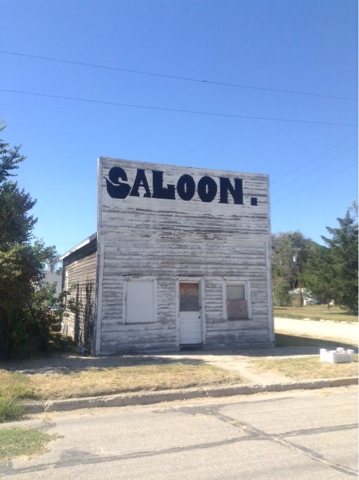Luck was with me when I reached the even smaller town of Buckingham. Its cafe was open and it served breakfast at all times, and like an increasing number of these small cafes, it offered WIFI, though it didn't advertise it. I could fuel up on a stack of hotcakes. That gave me more than enough energy to reach Sterling before dark. I didn't need to search out its Carnegie, the first since Fort Collins one hundred miles away, as I had made its acquaintance two years ago. Sterling is on the Platte River. On my last visit, it was bracing for a surge of flood waters headed its way from Boulder. I followed the Platte, staying ahead of the surge by a day, as communities all along the river were putting out sand bags. This year I would stay south of the Platte following route 6 going through a different series of towns across Nebraska with a Carnegie.
Just as two years ago, I happened to be in Sterling on the weekend of its annual town party. There was music in its central plaza and tents with vendors selling food. And all about town were bike sculptures similar to those I see along The Tour de France route. The first came as a surprise at a car lot.
Along the downtown streets were a series of mannequins on bikes.
I didn't have time to search for all of them in the waning light. The Platte River flowed through the outskirts of the Sterling. Along its banks was the Overland Trail Recreational Area. It offered picnic tables and some trails. There were no marked camp sites, nor signs prohibiting camping. I found a quiet nook amongst driftwood on a sandy bank that suited me fine. When I pushed my bike through the weeds the next morning, my tires were full of small burrs known as "goatheads" when I reached the parking lot. My front tire had picked up the majority of them. I couldn't simply brush them off. I had to extract them one by one, hoping they hadn't penetrated to the tube. I didn't hear or feel any air seeping out. But two miles down the road I could feel my front tire going soft. Later when I submerged the tube in water I quit counting after five tiny punctures in just a quarter of its diameter starting from the valve. A couple hours later my front tire went flat again. The wind had blown a goathead onto the road. I was riding in great peril, down to just one spare tube.
But as I closed in on Nebraska, the Cornhusker state, fields of corn began lining the road, driving out the weeds that produced the goatheads. After camping besides a bale of hay next to a corn field the next morning I awoke to a semi-soft rear tire, a super-slow leak from a goathead the day before. I didn't need to patch it then, rather pumping up the tire until I was in need of a rest later to replace the tube.
Now that I was in Nebraska, towns gave their population rather than elevation, though I knew I had dropped over one thouand feet from Fort Collins to under four thousand. The small towns every twenty miles or so were more dead than alive.
It was eighty-six miles from the border until I came to a town large enough to have a Carnegie, McCook with a population of four thousand. It was now a wing of the town's High Plains Museum, though it still proudly proclaimed itself a Carnegie Library on its exterior, unlike any of the fourteen I had just seen along Colorado's Western Front.
The new library, built twenty years ago, was two blocks up the brick-lined street, Norris, between First East and First West. Night was coming on, so I didn't take the time to give it a look. If I had known about the free camp site less than a mile away, complete with free showers, I wouldn't have been in a rush to get out of town to find a field to camp in. Four of the five campsites were occupied by retirees in RVs. It wasn't the first town along route 6 that offered such camping, but the first I had come upon with showers. The town park in many of the towns are their chief feature with covered picnic tables and rest rooms and sometimes the invitation to camp. Even though it was communal camping, I didn't object for this night.






1 comment:
My bike is currently in the shop -- first on the list is being filled with green slime to combat goatheads! Life in the southwest :)
Post a Comment